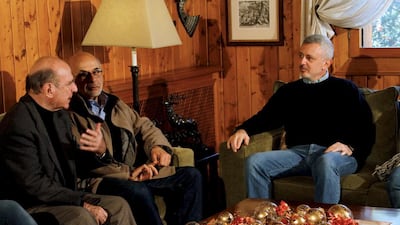The crisis between Saudi Arabia and Iran appears to have prevented any short-term agreement over the election of Sleiman Franjieh as Lebanon’s president. However, Mr Franjieh’s chances were already slim, largely because Hizbollah appears to not want a president today.
When Mr Franjieh was first proposed by former prime minister Saad Hariri, Hizbollah had reason to be wary. Mr Hariri’s offer could not have been made without Saudi approval, while it was known that the former American ambassador in Beirut had pushed Mr Franjieh’s name forward. Hizbollah was bound to rebuff an initiative endorsed by two of Iran’s rivals, whatever Mr Franjieh’s close ties with Bashar Al Assad were.
However, Hizbollah’s motives also appeared to be more profound. In rejecting Mr Franjieh the party perpetuated a debilitating political vacuum, one that it may agree to fill only in exchange for what it really seeks: a redrawing of constitutional shares to the advantage of the Shia community.
Under Lebanon’s post-1989 constitution, shares in parliament, the government and the civil service are distributed according to a 50-50 ratio between Christians and Muslims, with individual sects getting shares within this broader context. The Shia have long felt that the system underestimates their numbers, and Hizbollah probably views a favourable redistribution of shares as a means of protecting its autonomy in the system.
The party has denied wanting to change the constitution, but few believe it. Nor is there another good explanation for Hizbollah’s prolonging the presidential void while allowing rival presidential candidate Michel Aoun to hinder government decision-making. Officially the party supports Mr Aoun as candidate, but realises that all this does is block an election, as Mr Aoun does not yet enjoy majority backing in parliament, which elects the president.
There has been speculation in the Lebanese press that the Iranians are divided over Mr Franjieh, with reformers more open to a compromise and conservatives unwilling to surrender anything without getting concessions in return from the Saudis. Perhaps, but that suggests that Hizbollah seeks some benefits in exchange for giving a green light to an election.
The idea of reorganising constitutional shares makes sense for Hizbollah. The party allegedly seeks roughly a third of parliamentary and government shares for the Shia, with another third for each of the Sunnis and Maronite Christians. Smaller sects would get seats within this framework. In that way the Shia and Maronites would always represent a structural two-thirds majority over Sunnis, the main foes of Hizbollah.
Why would Christians go along with an amendment to the constitution that reduces their representation? Hizbollah’s calculation is that Christian fears of Sunni Islamism could lead them to accept a reduction in representation if it means a strategic alliance with an armed Shia community, allowing both to defend themselves against the Sunnis.
That’s the theory, at least, though there are many Christians who reject such a rationale. To them the idea of aligning with Hizbollah and the Shia against the Sunnis spells isolation for Christians in a Sunni-majority Middle East. Nor is it clear how a change can be made to the Lebanese constitution if Sunnis and a portion of the Christian community oppose it.
Lebanon’s sectarian power-sharing system is based on consensus and compromise. It is difficult to modify at the best of times, but even more so if a major community such as the Sunnis are hostile. That is why Hizbollah’s efforts may backfire.
However, the party doubtless sees things differently. Hizbollah has never been sensitive to the subtleties of the Lebanese power-sharing formula. It prefers to operate according to the dictates of power politics. However, in a climate of Sunni-Shia polarisation in the region, this is reckless, since Hizbollah’s power moves will only provoke strong resistance.
In the absence of any constitutional accord, however, Hizbollah can take solace in the fact that it is undermining the state and its institutions. This has been the modus operandi of armed pro-Iran parties in the Arab world. When they have been unable to dominate a state completely, they have ensured that the state is neutralised – a policy pursued in Iraq, Yemen and even Syria. It has also long been Hizbollah’s method in Lebanon.
The situation does not allow for much optimism.
Without a president and a functioning government and parliament, the Lebanese state is slowly disintegrating, especially economically. Hizbollah, in enhancing its own power, must be careful not to kill the beast. A collapsing Lebanon could create domestic sectarian instability and oblige Hizbollah to reconsider its military intervention in Syria on behalf of Iran.
Adding insult to injury, Iran has withdrawn its forces from Syria, leaving its Arab Shia allies to serve as cannon fodder in defence of Iranian interests. The road ahead will be tough for Hizbollah, despite its military prowess. Shaping Lebanon around its interests is no mean feat, particularly if ongoing efforts to end the current vacuum succeed.
Michael Young is opinion editor of The Daily Star in Beirut
On Twitter @BeirutCalling


